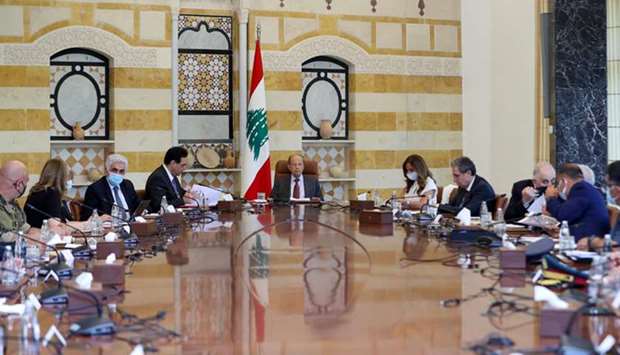Lebanese authorities toughened their tone on protests yesterday, promising arrests for “vandalism” after several days of angry demonstrations sparked by the country’s deepening economic crisis.
Hundreds of protesters clashed with security forces at the weekend across the Mediterranean nation whose currency has collapsed amid the worst financial crisis since its 1975-1990 civil war.
Relative calm returned on Sunday evening, with protesters holding a peaceful rally in the capital Beirut, while dozens marched to a central square in the northern city of Tripoli, AFP reporters said.
That came after three nights of violence in which demonstrators, angered by sky-rocketing prices and the government’s apparent inability to tackle a dizzying devaluation of the Lebanese pound, blocked highways and scuffled with security forces in the capital and the country’s north.
In Tripoli, young men attacked banks and shops and threw rocks at security forces who responded with rubber bullets and tear gas.
Medical services reported dozens of injured.
President Michel Aoun yesterday afternoon discussed the protests with the country’s top security body including ministers and military officials.
“Such acts of vandalism will not be allowed after today,” he said after the meeting of the Higher Defence Council.
Aoun called for “a wave of arrests, including of those who planned and carried out” such acts, according to a statement read on television after the meeting.
He ordered authorities to beef up “preemptive” operations to prevent similar violence from reoccurring.
In a separate statement released before the meeting, Prime Minister Hassan Diab condemned acts of “sabotage” committed by “thugs” in Beirut and Tripoli.
“Thugs have no other motive than vandalism, and they should be thrown in jail, period,” said a statement released by his office.
The official National News Agency later reported that the Lebanese army had launched a series of raids in Tripoli to arrest perpetrators of vandalism and violence.
The latest wave of demonstrations come almost eight months after the start of a mass protest movement over Lebanon’s crumbling economy and perceived official corruption.
The Lebanese pound plumbed new lows on Thursday, hitting 5,000 to the dollar for the first time.
The next day, authorities vowed to pump greenbacks into the market to limit the rout.
A Beirut money-changer said yesterday that the dollar was selling for up to 4,400 pounds.

A handout picture provided by the Lebanese photo agency Dalati and Nohra yesterday shows President Michel Aoun chairing a meeting of the Supreme Council of Defence, at the presidential palace in Baabda, east of the capital Beirut.
